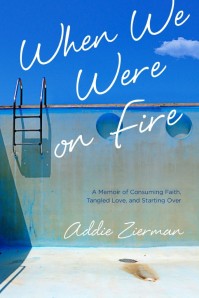Remember the 90s? Remember the tidal wave of cool that was flooding our churches, our youth groups, our prayers? Most of us do, in a vague, foggy kind of way. In this beautiful memoir, Addie Zierman writes about this era of Christianity with a candidness and a clarity that not only reminds us of what was going on, but puts into words the questions many have had, in hindsight, about what was really going on.
Starting off each chapter with a piece of “Christianese” (words Christians use that need to be explained to everyone else) and a definition, Zierman talks about things I haven’t thought about in years – things like AWANA, See You At the Pole, Teen Mania, WWJD bracelets. Back then, it seemed like in order to be a good Christian, all you had to do was dress modestly (a Jesus promoting t-shirt for every day of the week), be active at church (short-term mission trips, Bible study, etc.), and pray (fill journals with your girl cursive telling God how great he was and what you were feeling, who you liked, why you wanted God to make you a missionary). To be a super-Christian, you had to be a missionary. You had to be willing to leave it all and go live somewhere else. Because that’s what Jesus did for us, right?
Zierman’s book certainly doesn’t bash missionaries, and neither am I. She simply confesses in an honest and non-judgmental way that the reason she wanted to be a missionary during high school was not because of God, but because of Christianity. I’ve had a feeling about this for a few years now, and I was delighted to read the story of someone who decided not to be a missionary. (She still spent a year in China with her husband, but she was teaching English, not Bible stories, and it was hard, and they came back.)
After painting a picture of how clearly “on fire” for Jesus she was in high school, Zierman describes the experience of going to a small Christian college in a way that shows exactly how it is – for some people (I being one of them). At home she was the Bible study leader, the righteous one. At school, the Christians who had gotten everything right judged her for not having their taste in decorating, listening to non-Christian music, and going on late night walks with a boy. She described this experience not as a backsliding in her relationship with Christ, but as a disillusionment with evangelicalism. It was too stifling, too pigeon-holed, too legalistic.
From there, she describes the loneliness she felt, even after her marriage, as for many years she was unable to find within evangelicalism the community and deep understanding and friendship that she craved. She slid into depression, mild alcoholism, and emotional adultery. It took a long time and a lot of counseling to make it back – a lot of forgiveness directed toward things that happened back when she was on fire. But she did make it, and this book is her beautiful story.
There were very few things in this book I disagreed with. Usually I take this as a warning sign, that maybe I am not thinking about the book critically enough. But it’s a memoir! It’s hard to disagree with someone’s life. What I did feel was an astounding sense of recognition. That Zieman’s story is not just hers. That it belongs to a generation that was duped into believing they were holy if they wore enough Jesus t-shirts, sang enough songs, met every dilemma with WWJD? Anyone can learn from this book. Everyone can respond to it, whether you grew up in, were consumed by, or are struggling to recover from the Christian subculture that led everyone to believe that fires could never go out.
In short – YOU should read this book. (But you should read this first.)
Addie’s website and author bio, and you can read a sample chapter here.
I received this book for free from Blogging for Books for this review.
Related articles
- Confessions of a recovering Jesus freak (katieleigh.wordpress.com)
- When We Were on Fire (Review + Giveaway) (redemptionpictures.com)
- When We Were on Fire [a review] (caramichelestrickland.wordpress.com)

